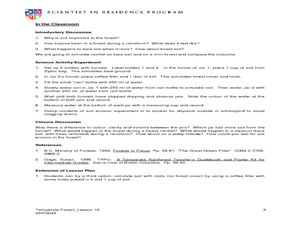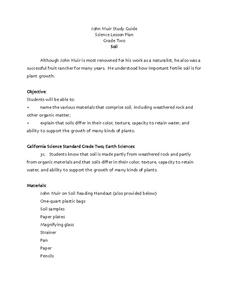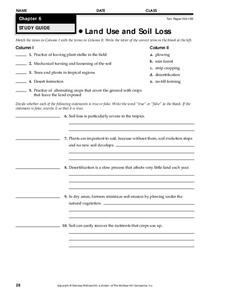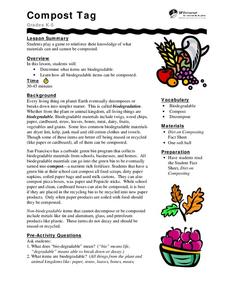Curated OER
Let's Make a Compost Cake
Students create a compost cake. In this gardening and decomposition science lesson, students review and describe the "nutrient cycle." Students create a compost pile, measure and record the dimensions and temperature of the pile, and...
Curated OER
Colors of our Earth
Students are introduces to soil profile classification. They remember that classification of soils is an important aspect of studying soils as it aids in predicting how soils react to weathering, transport nutrients or pollution. ...
Curated OER
Forest as a Filter
Students experiment using soil and water. In this forest as a filter lesson plan, students identify the role of forest cover, vegetation, and foliage impacts erosion and evaporation. Students conduct a simple experiment, form a...
Curated OER
Worm Composting
Second graders discuss worm composting. In this decomposition lesson, 2nd graders look at the anatomy of the worm and how it eats food. They have their own worm bin and review what foods can and can not be given to the worms for...
Curated OER
Dirt: Making Dirty Water Clean!
Fourth graders study soil and water. In this water lesson students work in groups and use a filter to clean water.
Curated OER
Soda Bottle Compost: Nutrient Cycling in Action
Learners explore and observe significant contributions to wildlife and measure soil nutrient capacity by performing simple tests to determine the amount of phosphorous. They assess the importance of making and recording detailed...
Curated OER
The Marvels of Mud
Young scientists roll up their sleeves and get a little dirty in this three-day earth science investigation. Following the scientific method, children monitor the growth of algae in pond water samples in order to determine the role that...
Curated OER
Soil
Second graders name the various materials that comprise soil, including weathered rock and other organic matter. They explain that soils differ in their color, texture, capacity to retain water, and ability to support the growth of many...
Curated OER
Land Use and Soil Loss
In this land use and soil loss worksheet, students match 5 types of land use with their description and write true or false to 5 statements about the effects of land use and soil loss. The correct false statements to make them true.
Curated OER
Ecological Succession in Pond Water Cultures
Learners collect samples of pond water, dried grass, and soil in a jar. They predict the order of ecological succession in their pond water cultures. They compare their expected results with their observed results.
Curated OER
Compost in a Bag!
Fourth graders experiment to see which objects decompose. For this compost lesson, 4th graders observe the changes of labeled objects in a bag. Leave the objects for one month and record the changes by observation and weight. Students...
Curated OER
Using Soil properties and Vegetation Differences to Hypothesize the Land Use History and Topographic Differences between Two Locations
Ninth graders take soil samples and perform tests on these samples.
Curated OER
Soil Research
Third graders work together in groups to discover the importance of soils. Using a worksheet, they answer questions as they surf the internet. They observe three different types of soils and record their observations and use the internet...
Curated OER
Selecting Soil Organisms in Compost
Students conduct an experiment to demonstrate that many of the enzyme systems needed to break down society's wastes exist in nature among the decomposers in a compost pile. They culture compost bacteria on starch agar to examine the...
Curated OER
Mud in the Water
Learners build a soil erosion model to study the importance of soil conservation. They investigate how land forms from both constructive and destructive forces.
Curated OER
Helping the Soil
In this soil conservation worksheet, students study and analyze two excellent ways to enhance soil conservation: compost heap and leaf-mould. Students review all the ingredients in making both.
Learning Games Lab
Cattle Feeding
Finding a balance between too much protein and not enough doesn't have to be a guessing game. Young scientists use an interactive lesson to learn how to calculate protein content in cattle feed and how to mix feed to create the ideal...
National Park Service
The Secret of Life
Dead trees provide nutrients for the soil, food for animals, protection and a home for organisms, a seed-bed for new trees, and a place for nitrogen-fixing bacteria to live. In the activity, pupils collect decaying logs, expose them to a...
National Park Service
Reduce Our Carbon Footprint, Let’s Compost!
Roll up your sleeves and get a little dirty with this elementary and middle school compost lesson. All you need is a large plastic container, a couple old newspapers, some organic waste, and a few hundred worms and you're ready to start...
K12 Reader
Ecosystems
Examine how living and non-living things work together in a reading passage about ecosystems. Class members read the text and then respond to five response questions that relate specifically to the content of the passage.
SF Environment
Compost Tag
Composting is a great way to get children involved in recycling. First, they discuss how biodegradable products decompose to make compost. Then, they talk about what can and cannot be composted. They play a game similar to around the...
Baylor College
Needs of Plants
What better way to learn about plant life than by creating a class garden? Young botanists start with a brief discussion about radishes before planting seeds and watching them grow. To determine the importance of water, sunlight, and...
American Museum of Natural History
What's the Big Deal About Water?
It may seem simple, but water is one of the most unique substances on Earth. An interactive online lesson describes its properties and importance in so many different situations. Learners interact with the lesson to learn the role water...
Curated OER
Geography Action! Rivers 2001-Runoff
Young scholars experiment with how rain affects topsoil using dirt and red tempera paint. At the end of the activity, students find red water in their collection jar, representing nutrients in the soil.

























